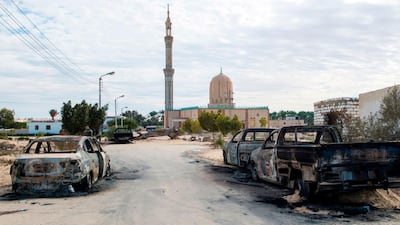The killing of more than 300 people in the worst terror attack in recent Egyptian history has highlighted the threat posed to the country’s Sufi community.
While no group has admitted to the gruesome attack on the Rawda mosque in the Sinai Peninsula, ISIL is assumed to be behind the attack.
One explanation for the motive of the attack was due to the mosque’s association with a Sufi order.
Sheikh Abdel Hadi Al Qasabi, the head of the Supreme Council of Sufi Orders, said the mosque was associated with the Jariri Sufi order, but denied that there was a sectarian motive behind the attack.
However, in a publication last January, ISIL said it would target Sufi orders and called Sufism “a disease”. Earlier this year it claimed responsibility for beheading a Jariri elder. Al Qasabi did not respond to a request for an interview.
In other countries, ISIL has targeted Christians, and Shiite Muslims, and killed countless Sunnis. But unlike Shiites, Sufism is not a specific sect of Islam, but rather a set of practices considered to be an important part of the practice of Sunni Islam in Egypt. It is broadly defined as a mystical set of Islamic practices.
“It’s about as difficult to define as Islam itself, because it’s that vast,” said Valerie Hoffman, an Islamic Studies professor at the University of Illinois.
The most closely associated practice with Sufism is dhikr, which is reminding oneself to avoid the distractions of earth and focus on God. That practice has its roots in the earliest Sufis who lived an ascetic lifestyle and criticised the early Muslim societies’ accumulation of wealth as the religion spread rapidly in its early years. The name Sufi could come from the Arabic word for wool, a reference to the earliest practitioners’ simple clothing.
“You can find Sufis among Sunnis, and among Shia. In the 12th century we had the formation of Sufi orders,” Dr Hoffman said. “Sufism became a mass popular movement and at that point the number of the people who were connected with Sufi orders was massive.”
As the orders proliferated, charismatic Sufi Sheikhs would tailor the dhikr to cultural or personal needs. Music, dancing, bowing, and recitations differ across orders.
Important sheikhs were buried and seen as having special connections to God. Egyptians would often pray at their burial sites and this became a routine practice by the Mamluk period. It is common for any Egyptian town to have a local Sufi shrine.
In the 19th century, Mohamed Ali Basha, the Khedive of Egypt, moved to organise Sufi orders under the state and created a licensing system for both the collection and redistribution of funds to and from Sufi orders. In 1903 the State Supreme Council of Sufi Orders was created, and today, law bans orders from engaging in activities not permitted by the Council. Egypt recognizes 77 Sufi orders, including the Jariri Order.
Academics think that roughly 15 per cent of Egyptian Muslims regularly engage in Sufi practices, but such acts are very widespread in Egypt. A few political parties with a Sufi orientation were created after president Hosni Mubarak was overthrown in 2011, and when Egypt organised constituent assemblies to rewrite its constitution, Sheikh Al Qasabi was included to represent Sufis.
Still, Sufism can not be classified as political, or non-political, said Omid Safi, a professor of Islamic Studies at Duke University.
“They have engaged in the same set of politics as other Muslims: at times sanctifying corridors of power, at times challenging the powers that be, and at times avoiding political authorities,” he wrote in an email.
Eid Abou Jarir founded the Jariri order in the mid 20th century, quickly gaining a large following with Sinai Bedouin. He was a resistance leader during the Israeli occupation of Sinai and was a member of the Sawarka Tribe in Sinai.
“Egyptian Sufism has had a pivotal role in the Arab world,” Mr Safi said. “It has been focused to a beautiful degree around love and devotion towards the Prophet, particularly around the Burda, the poem that offers the seekers hope for the intercession of the Prophet, and the family of the Prophet.”
Musicians singing Sufi poems are hugely popular in Egypt, and some have toured internationally.
Egyptians will celebrate the Prophet Mohammed’s birthday on Thursday and Friday in Egypt. Typically, Sufi orders organise festive street processions to gathering places, but this year the supreme council cancelled street celebrations. Officials said it was to mourn the attack with other Egyptians.
The militants reportedly threatened villagers in Bir Al Abd, the scene of the attack, regarding celebrations for the Prophet Mohammed’s birthday. In the Egyptian mainland, dozens of shrines have been attacked since Mubarak’s downfall, mostly by hardline Salafis, Sufi leaders said.
“However they have come to negotiate politics, they have never been able to avoid politics,” Mr Safi said.

